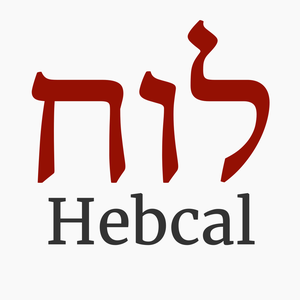Your comments
Hi, thanks for your message. Sorry to hear that you are having difficulty accessing hebcal.com. According to our automated monitoring the website is running fine. We did a manual check and can't find 502 error messages.
Can you post a screenshot?
The Alternate Haftara are used by some conservative congregations.
Haftarot for a Triennial Cycle Torah Reading
Great, glad to hear that worked for you.
If you wish to download dates further into the future, go back to the custom calendar page (step 1 above) and enter a year further into the future (for example 5787) and repeat the process. Each time you'll be able to download a 10-year CSV file.
Hi, thanks for using Hebcal.
From reading an article that Microsoft posted, I believe it's possible to use Unicode characters in a folder name
https://learn.microsoft.com/en-us/windows/win32/intl/character-sets-used-in-file-names
Hi, thanks for using Hebcal.
You can download a CSV file with Rosh Chodesh dates that you can modify for your purpose
1. Go to https://www.hebcal.com/hebcal
2. Uncheck all boxes except Rosh Chodesh
3. Click Create Calendar button at the bottom of the page
4. On the next page, click Download
5. Click CSV at the top of the download dialog box, the click the grey Download CSV button
6. Modify the CSV file in your favorite spreadsheet app as you see fit
We've added a feature for IFTTT and other APIs where you can append ?yto=1 to a Hebcal URL so the events that show up are only yom tov holidays.
For example:
https://download.hebcal.com/v4/CAFAAWoBc4ABAZgBAaABAQ/hebcal.ics?yto=1
For Gregorian year 2023, for example, only the following holidays would be considered Yom Tov:
| Thu 06 Apr | Pesach I |
| Fri 07 Apr | Pesach II |
| Wed 12 Apr | Pesach VII |
| Thu 13 Apr | Pesach VIII |
| Fri 26 May | Shavuot I |
| Sat 27 May | Shavuot II |
| Sat 16 Sep | Rosh Hashana 5784 |
| Sun 17 Sep | Rosh Hashana II |
| Mon 25 Sep | Yom Kippur |
| Sat 30 Sep | Sukkot I |
| Sun 01 Oct | Sukkot II |
| Sat 07 Oct | Shmini Atzeret |
| Sun 08 Oct | Simchat Torah |
Tisha B'Av is the Ninth of Av. It is a fast commemorating the destruction of the two Temples.
Tu B'Av is a minor Jewish holiday of love. It is observed on the 15th day of the Hebrew month of Av.
Thank you for this suggestion!
Customer support service by UserEcho


Hi, please try these instructions which should also work for Outlook 2021 for Windows
https://www.hebcal.com/home/8/outlook-ics-jewish-holidays